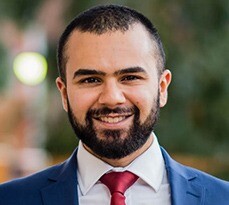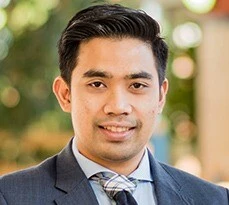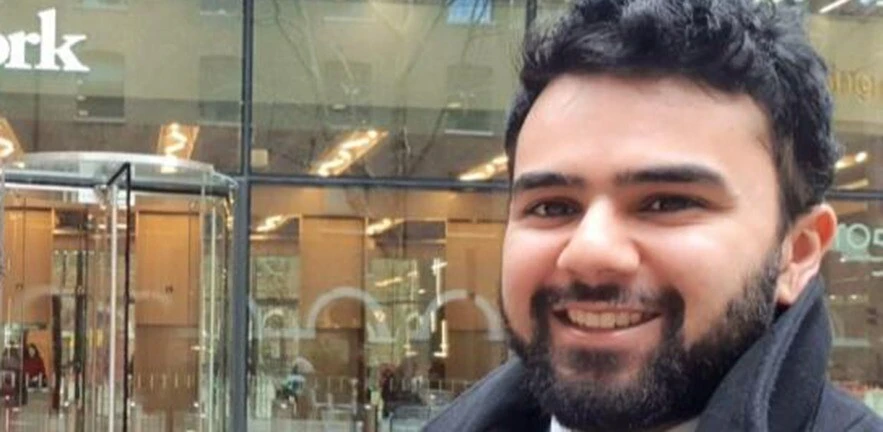Kestrl’s ambition is to become the UK’s leading money manager by making it much easier to save and invest in line with religious and personal beliefs, on one convenient platform.

“No one should have to compromise on their beliefs to achieve their financial goals,” according to Kestrl’s CEO Areeb Siddiqui.
Areeb launched the London-based startup with fellow Cambridge MBA alumnus and COO, Daeng Termizi, in March of 2020.
“It’s incredibly motivating knowing that you’re on the front line of innovation using technology to disrupt archaic business models, to make a real difference to people who have been left behind by the financial industry,” adds Areeb.
Through its mobile app Kestrl offers customers a one-stop ethical financial shop to store, spend and grow their wealth.
It does this by linking a customer’s bank accounts together to give complete oversight of finances. With this “bird’s eye view” Kestrl is using AI to create bespoke personal solutions so that customers can spend and save in line with their values. For longer term goals a “marketplace” is under development where halal and ethical investments will be available.

“We want to make personal finance easy for everyone, starting with the underserved British Muslim community, who find it difficult to bank and invest in the UK in accordance with their religious values,” says Daeng.
Islamic Finance is largely based on equity rather than debt. Under Sharia law Muslims are prohibited from earning or charging interest when lending or borrowing money, so accounts must be interest free. Business activities considered “detrimental” to society like gambling or alcohol are forbidden.
The search for personal and nationwide answers began in a lunch queue in Cambridge.
Impetus for radical change
“Why don’t you use an Islamic bank?”
It was a simple enough question asked during an MBA lecture break, yet Areeb, a practising Muslim, realised he knew too little about the Islamic options available in the UK to give Daeng an adequate answer.
Several conversations later, the pair fixed on a nationwide survey for their summer MBA research project to find out more about Muslim banking habits. The results provided the key insights that are shaping Kestrl’s vision.
A huge demand for Sharia-compliant solutions was identified among Britain’s 2.1 million adult Muslim population. The vast majority, 90% of the 1000 Muslims surveyed, wanted services to fit their faith, yet over 75% used no Islamic products at all. The participants had little awareness of where to source halal alternatives beyond the UK’s five main Islamic banks, which were considered expensive, inconvenient and lacking in useful digital applications.
“The results were overwhelming. People were settling for less and that didn’t sit right with us. With our combined backgrounds in fintech and Islamic finance, Daeng and I felt we almost had a duty to take this on,” says Areeb.
Uniting faith with finance
The overriding promise by Kestrl is “never to loan deposits out” so that British Muslims will know exactly where their “money is at all times”.
The firm’s first plan for a debit card release had to be immediately delayed due to the “seismic shift” in the needs of the Muslim community during the first UK COVID-19 lockdown last year.
A budgeting tool was launched instead, with options to pay off debts and set up an emergency fund. Now the focus is on finding solutions for the difficult issue of savings accounts.
“A big problem for Muslim consumers is that there have been few Islamic options for growing wealth, so we are negotiating with the UK’s Islamic banks to become a digital front end for accounts that do offer a return on savings,” says Areeb.
Sourcing investments has been an equally complex task. Kestrl’s answer is a “marketplace” of vetted investment opportunities in gold, property, and Islamic pensions for launch later this year. By the end of 2021 the company has plans for its own equity-based home purchase product to help those who are unable to make a deposit on a property.
To achieve their “true alternative to banking” the startup is working with Data Scientists in Oxford, and a tech team of 11 in Malaysia where Daeng is based.
Spreading ethical wings
It started as a joke about Kestrel a British bird of prey going after Starling Bank, but the name stuck.
Kestrl’s brand is deliberately “ethical” and designed to win over sceptical young Muslims and to build a wider base among millennials and Generation Z, who value environmentally friendly solutions and often distrust conventional banks.
“We found young Muslims care just as much about their money doing good in the world, as they do about ticking a ‘no-interest’ box. They don’t like solutions which claim to be Muslim as they think the brand is trying to take advantage of them.”
“We are building Kestrl to be accessible to all, with innovative products which will have appeal regardless of religion,” says Areeb.
This model of avoiding overtly religious or Arabic branding echoes Yielders, a successful Islamic property fintech in the ecosystem.
A carbon calculator that estimates an individual’s carbon footprint based on spending habits is just one of the upcoming ethical products under development that Kestrl is excited about.
Standing out in a buoyant fintech crowd
Kestrl’s entrepreneurial flight path takes it into in a crowded sky. The UK is the leading centre for Islamic finance in the West with a market worth £14 billion annually. Within its rapidly growing fintech sector, 27 firms are now vying for attention.
Many of these however are simply offering a conventional business solution with an Islamic label attached, according to Areeb. Kestrl is taking a more pioneering approach. As the first UK Islamic fintech to take advantage of open banking, it uses one app with novel solutions to do the job of many.
“We spotted a real opportunity with open banking to transform people’s personal financial journeys. We are differentiating ourselves by becoming the only platform that customers will need whether it is opening a savings account, checking an investment portfolio, or taking out a mortgage.”
“Our real value proposition is that customers don’t have to use multiple platforms to achieve their goals,” says Areeb.
However, some consolidation and attrition is now expected within this competitive landscape – given the challenges of taking significant market share in a relatively small audience.
Attracting a wider audience and working in partnership with other firms are considered some of the ways forward. Kestrl is already in talks with third party investment companies and with traditional Islamic banks. Daeng says they are well placed to do more.
“As Kestrl essentially operates as a platform, we envisage that we will have strong collaboration with other fintech players in the UK making it is easier for them to reach critical mass and acquire customers,” adds Daeng.
Cambridge, we have lift off
“I think it’s probably both thrilling and terrifying in equal parts,” says Areeb summing up his first year of fintech life on the frontline.
Neither Daeng nor Areeb had any plans to become entrepreneurs when they joined the Cambridge MBA Class of 2018. They had intended instead to return to more senior roles within Bank Negara Malaysia and PwC, respectively.
But as Daeng says, “Things happen with an MBA”.
“It’s the mixture of the academic programme, your classmates and peers, and the overall Cambridge experience. This gave me the confidence to start Kestrl.
“I think the first step is the most crucial in any journey and being in the right environment really does wonders.”
“The wide breadth of business knowledge, from strategy to marketing, that I acquired during the Cambridge MBA certainly helps in starting the business, as resources are limited and you have to play multiple roles in a startup,” says Daeng.
On graduating Kestrl was accepted onto the prestigious Accelerate Cambridge programme run by the Cambridge Judge Entrepreneurship Centre. Advice from independent mentors at the Accelerate Cambridge programme is providing ongoing support.
Both Areeb and Daeng tailored their MBA learnings, selecting the Entrepreneurship and Digital Transformation elements of the MBA programme.
“Doing the MBA had a significant impact on my life. Without the guided opportunities and stewardship of the Cambridge MBA courses, I would never have considered entrepreneurship,” says Areeb.
Areeb defines it as entrepreneurial osmosis, the process of being surrounded by an “incredible network of experienced entrepreneurs” that made a startup a viable option for him. He does have one outstanding regret, however.
“I really wish we had come up with the idea a bit earlier. We could almost have used every single lecture and every single project as a litmus test for our ideas as many of the other entrepreneurs in our cohort were able to do.”
Over the horizon
Interest in the early startup is on the rise in the British Muslim community. Notably, several chief executives from Islamic banks have invested and joined the Kestrl board.
The priority for 2021 is converting this awareness into downloads. Their product roll out in May is expected to bring many more customers, beyond the circa 1500 using the budgeting tool at present.
Monthly subscriptions, marketplace commissions and its own home purchase product are some of the income streams they are pursuing for sustainability. To attempt blitzscaling like neobank Monzo, where growth is prioritised over profit, is considered an “old hat” approach at Kestrl.
Over the horizon and beyond, Kestrl is looking to expand into Malaysia or Indonesia by late next year. (One of the key advisors already in place is the head of HSBC Amanah for South East Asia.)
Operational profitability is set to be achieved by its fifth year after launch in 2025.
As promised from the start, Kestrl still has no plans to become a bank. They don’t need to, they say.


